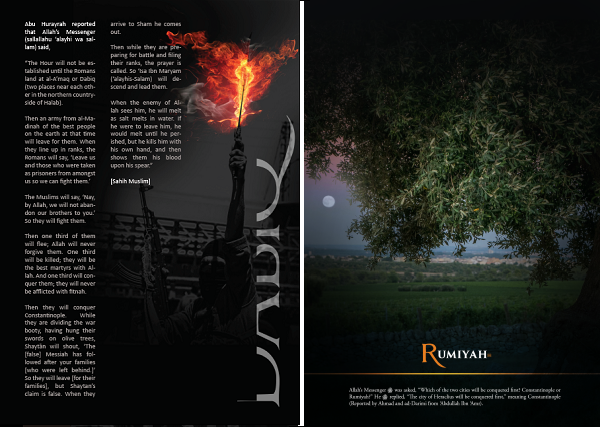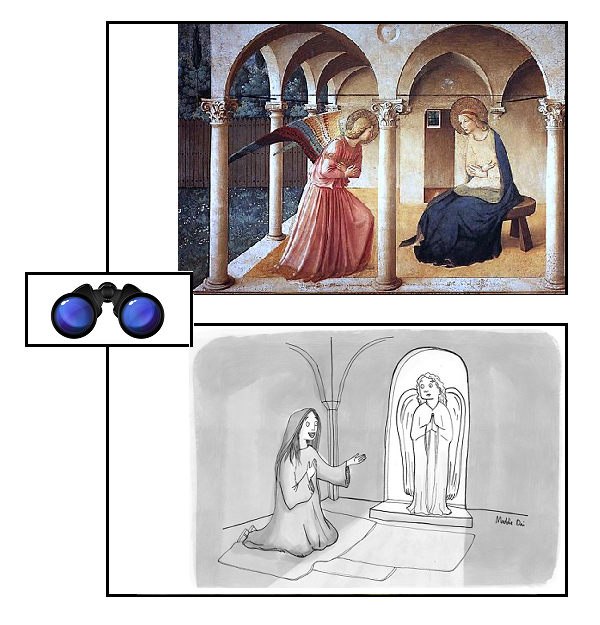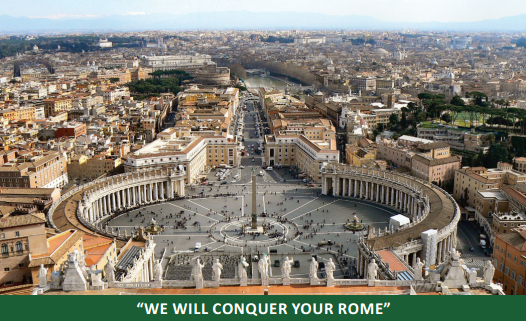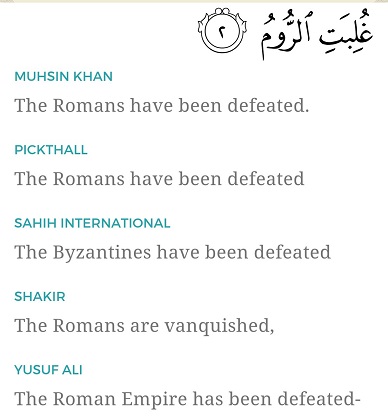[ by Charles Cameron — Rumiyah is a city for sure, Dabiq not so much ]
.
The Islamic State has a new magazine out, and it’s titled Rumiyah, not Dabiq. Here’s the first inside page of the first issue of Dabiq, together with the cover of the first issue of Rumiyah:

And here’s the back cover of each magazine:

What’s significant here is that the names of both magazines, like bookends, refer to a significant location in IS eschatology — but not the same place, two different places. And thereby hangs my Tale.
**
The front cover of Rumiyah, the new magazine, opens with a quote from Abu Hamzah al-Muhajir, who was Abu Mus’ab al-Zarqawi‘s immediate successor as emir of Al-Qaida in Iraq (AQI), the precursor to the Islamic State:
O muwahhidin, rejoice, for by Allah, we will not rest from our jihad expect beneath the olive trees of Rumiyah (Rome)
Moreover, the back page of Rumiyah, the new magazine, features a hadith about Rome:
Allah’s Messenger (saw) was asked, “Which of the two cities will be conquered first? Constantinople or Rumiyah? He (saw) replied, “The city of Heraclius will be conquered first,” meaning Constantinople (Reported by Ahmad and d-Darimi from ‘Abdullah Ibn ‘Amr).
**
By way of contrast, the first issue of Dabiq opens with a quote from Abu Mus’ab al-Zarqawi, the founder of AQI and thus “grandfather” to the Islamic State:
The spark has been lit here in Iraq, and its heat will continue to intensify – by Allah’s permission – until it burns the crusader armies in Dabiq.
The back page then offers this hadith concerning Dabiq:
Abu Hurayrah reported that Allah’s Messenger (sallallahu ‘alayhi wa sallam) said,
“The Hour will not be established until the Romans land at al-A’maq or Dabiq (two places near each other in the northern countryside of Halab).
Then an army from al-Madinah of the best people on the earth at that time will leave for them. When they line up in ranks, the Romans will say, ‘Leave us and those who were taken as prisoners from amongst us so we can fight them.’
The Muslims will say, ‘Nay, by Allah, we will not abandon our brothers to you.’ So they will fight them.
Then one third of them will flee; Allah will never forgive them. One third will be killed; they will be the best martyrs with Allah. And one third will conquer them; they will never be afflicted with fitnah.
Then they will conquer Constantinople. While they are dividing the war booty, having hung their swords on olive trees, Shaytan will shout, ‘The [false] Messiah has followed after your families [who were left behind.]’ So they will leave [for their families], but Shaytan’s claim is false. When they arrive to Sham he comes out.
Then while they are preparing for battle and filing their ranks, the prayer is called. So ‘Isa Ibn Maryam (‘alayhis-Salam) will descend and lead them.
When the enemy of Allah sees him, he will melt as salt melts in water. If he were to leave him, he would melt until he perished, but he kills him with his own hand, and then shows them his blood upon his spear.”
[Sahih Muslim]
**
It looks to me that Rodger Shanahan has the difference nailed in his Lowy Interpreter piece, Australia stars in first edition of new ISIS magazine:
First is the name change; no longer is ‘Dabiq’ the title (unless this masthead continues to put out editions separately); ‘Rumiya’ [sic] (formal Arabic for Rome) has replaced ‘Dabiq’. As most marketers will tell you, when a company’s brand is on the skids then it’s time for a refresh.; the same applies to jihadists. Jabhat al-Nusra has (to date) unsuccessfully tried to re-brand itself as a non-Al Qaeda jihadist group by changing its name to Jabhat Fatah al-Sham, as its old name long ago became a dead weight on its leadership aspirations.
With its hold on territory becoming more precarious by the day, ISIS has possibly decided that naming your social media magazine after a town that will likely soon fall out of your control would not be a good look ‘going forward’. Re-naming your publication after the centre of Christendom is a way to show what you aspire to, rather than what you have lost. It’s also in line with the late Muhammad al-Adnani’s recent claims that IS did not fight for territory as a way of extolling the virtues of continuous jihadi resistance.
**
Recent posts featuring the idea that we may be near the end of ISIS, at least as a proto-state:
Kyle Orton, The End of the Islamic State by Christmas?
Kyle Orton, Is This the Beginning of the End for the Islamic State?
Anthony Cordesman, Syria and Iraq: What Comes After Mosul and Raqqa?
Washington Post, Flow of foreign fighters plummets as Islamic State loses its edge










